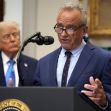A federal judge has ordered the U.S. government to continue reimbursing Planned Parenthood clinics through Medicaid, blocking a provision in President Donald Trump’s recent tax law that aimed to cut off funding to abortion providers.
The ruling, issued Monday by U.S. District Judge Indira Talwani in Boston, extends an earlier order that had only protected certain Planned Parenthood affiliates. That initial decision applied to clinics that either do not offer abortion services or receive less than $800,000 in Medicaid reimbursements in a single year. The updated order now applies nationwide.
The legal challenge centers on a provision in the tax legislation that took effect on July 4. It directs the federal government to suspend Medicaid funding for one year to any provider that received over $800,000 in Medicaid reimbursements in 2023 and offers abortion services. While the law does not name Planned Parenthood, the organization says the measure targets its nearly 600 health centers in 48 states. At least one other provider, based in Maine, has also been affected.
In her order, Judge Talwani said that limiting access to healthcare services during the dispute could result in negative consequences for patients, including more unintended pregnancies and undiagnosed infections due to reduced access to contraception and testing. She emphasized that the court is not requiring the government to fund services outside of Medicaid’s scope, nor is it restricting the government's ability to regulate abortion. Instead, the ruling blocks the exclusion of Planned Parenthood from Medicaid reimbursements while the case is ongoing.
The lawsuit was filed earlier this month by Planned Parenthood Federation of America and its affiliates in Massachusetts and Utah against Health and Human Services Secretary Robert F. Kennedy Jr. In the complaint, Planned Parenthood argues that the new funding rule could force the closure of nearly 200 clinics in 24 states, potentially cutting off care for over one million patients who rely on Medicaid for services such as cancer screenings, contraceptives, and STI testing.
A spokesperson for the Department of Health and Human Services responded to the ruling by saying the agency strongly disagrees with the decision, arguing that it limits state flexibility and ignores concerns about accountability. “States should not be forced to fund organizations that have chosen political advocacy over patient care,” said communications director Andrew Nixon.
Medicaid is a public health insurance program that covers millions of low-income and disabled Americans. According to Planned Parenthood, roughly half of its patients rely on Medicaid for healthcare services.
The court’s injunction will remain in effect as the case moves forward in federal court.






